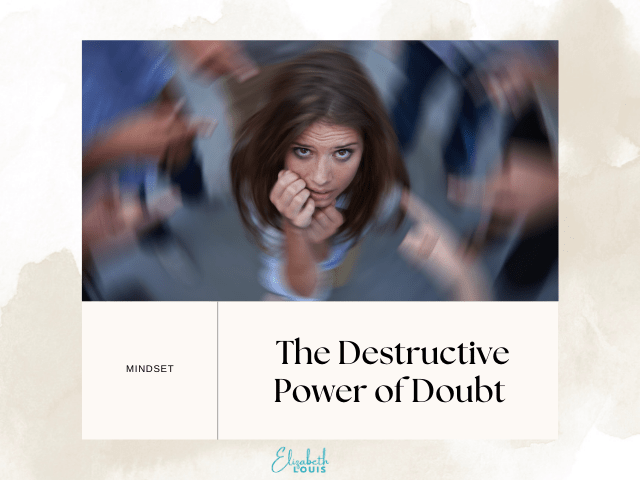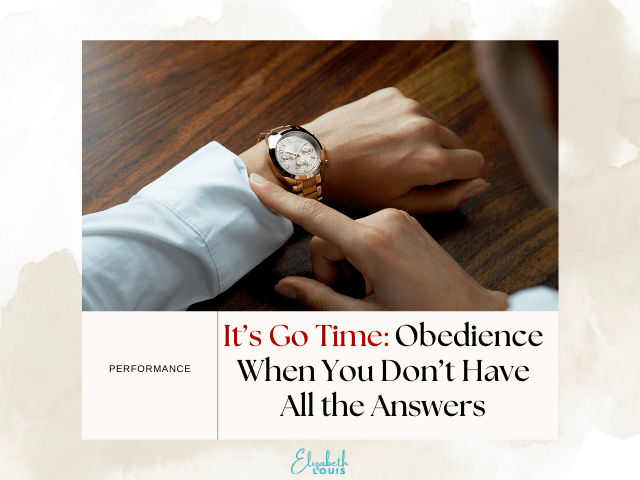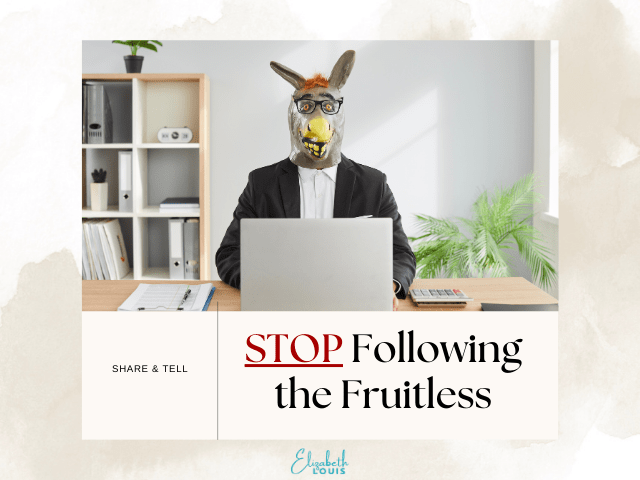
By: Elizabeth Louis
Let’s delve deeper into the destructive power of doubt…
Did you know that doubt can profoundly impact our lives more than failure or negative thinking?
💥YIKES💥
You may be wondering why that is the case.
Well, doubt has this incredible ability to keep us in a state of perpetual uncertainty, preventing us from taking decisive action and moving forward. While negativity and other factors can also contribute to a sense of indecisiveness, doubt uniquely paralyzes us and leaves us stuck.
Think back to the last time you found yourself doubting something. Recall the internal conflict that arose within you. One part of your mind believed in your capabilities, while another part doubted your potential for success. This internal tug-of-war left you stranded in a state of limbo, unable to make progress or make a clear decision.
By the way, this internal tug-of-war is called self-conflict. When you have doubt, you are in conflict with yourself. That conflict must be ironed out if you want to move forward efficiently.
A Metaphorical Visual of Doubt
Imagine doubt as a metaphorical three-legged race, where you and your partner have vastly different strategies and expectations and fail to communicate effectively. In such a scenario, it becomes nearly impossible to move forward effortlessly when two opposing forces are constantly at odds with each other. This is precisely what doubt does to our souls. Make sense? Doubt pulls us in conflicting directions, creating chaos and hindering our personal growth and development. It sows seeds of hesitation, making embracing opportunities and taking risks difficult. It dampens our self-belief and confidence, making pursuing our dreams and aspirations harder. Moreover, doubt breeds self-doubt. The more you allow doubt to exist in your mind, the stronger the doubt will become. It breeds faster than bunnies. When we constantly question our abilities and second-guess ourselves, we undermine our own potential and limit our achievements. It becomes a never-ending cycle of uncertainty and self-sabotage. In time, your brain and mind become trained in this type of relationship with yourself.
Overcoming Doubt
To overcome doubt, we must learn to confront and challenge our negative thoughts and beliefs. We need to cultivate a mindset of assurance and resilience, reminding ourselves of our strengths and accomplishments, but most importantly, our efforts. Focusing on implementing your effort is the only thing you have control over. Sure, you want the ideal outcome, but everyone is helpless over the outcome.
Surrounding ourselves with a supportive network of individuals who believe in us can also help counteract the effects of doubt. At times when you want to give up, simply talking to those who support and believe in you can do wonders for your soul.
Kind words are like honey— sweet to the soul and healthy for the body (Proverbs 16:24).
Remember, doubt may be a formidable adversary, but we can rise above it with awareness and determination. By embracing a mindset of certainty and taking decisive action, we can break free from the shackles of doubt and unlock our true potential.
How to Overcome Doubt: A Step-by-Step Process
1. Trust God
When you trust a higher power, it’s truly amazing how much more effective you become. Personally, my faith lies in the Lord Jesus Christ. Over the past decade, working as an Executive Performance Coach, I have gained valuable insights into the impact of belief systems on individuals. It’s fascinating to observe that those who don’t believe in a higher power often carry higher stress levels and face more significant difficulties in various aspects of their lives.
Having a firm belief in a higher power provides a sense of assurance and guidance. It instills a deep understanding of purpose and meaning, allowing individuals to approach challenges with confidence and resilience. When faced with obstacles, those who trust in a higher power can draw strength and find solace in their faith, enabling them to overcome adversity with grace.
Additionally, it’s relying on the power of God within you to help you accomplish tasks. For instance, I am constantly repeating this verse to myself; I can do all things through Christ who strengthens me (Philippians 4:13). It’s incredible how much this verse strengthens me but also how much more confidence I have because I know I am not alone and God is helping me.
In contrast, individuals lacking faith in a higher power may constantly wrestle with uncertainty and self-doubt. The absence of a guiding force can lead to constant questioning, making it challenging to make decisive actions and move forward purposefully. This perpetual internal conflict can create a sense of paralysis and hinder personal growth. Plus, it’s exhausting and terrifying to feel like your entire life is in your hands and your hands alone.
Moreover, when we question our abilities and constantly second-guess ourselves, we unintentionally undermine our potential and limit our achievements. Doubt becomes a self-perpetuating cycle that keeps us from reaching our true potential. It breeds faster than rabbits, spreading throughout our thoughts and beliefs, eroding our self-belief and confidence.
In summary, when we trust in a higher power, we tap into a source of strength and guidance that empowers us to navigate life’s challenges more easily. My belief in the Lord Jesus Christ has been a driving force in my journey as an Executive Performance Coach. I have witnessed firsthand the transformative power of faith in helping individuals overcome stress and embrace their true potential. So, I encourage you to embrace your faith and trust in a higher power, for it has the power to unlock a world of possibilities.
2. Make a Choice to Believe in Yourself
The intentional step of choosing to believe in yourself is a game changer. It’s pretty simple and quite challenging. You have to decide and think that you can do “it.” Once you make up your mind and decide you can do “it” (whatever “it” may be), then you want to make sure your self-talk mirrors that decision. Leverage an optimistic perspective and the champion mindset in this step, too. What that looks like is remembering through hard work, consistent effort, and diligence, you will get there. Often, the time frames imposed on ourselves limit us more than help us. When you attempt to achieve anything, you will experience setbacks, failure, and hardship, but it doesn’t have to have the final say if you don’t allow it. There are tremendous learnings you can gain from these less-than-ideal realities. They are strengths, not weaknesses, because they provide you with huge data.
3. Plan for Best Case Scenario
Did you know the worst-case scenario (fear) and best-case scenario (faith) are equal in substance? Neither situation has occurred yet. Since humans work to create their most dominant thoughts, why not focus on the best-case scenario? Eventually, you have to go all in and believe in yourself. To do that, focus on best case scenario and make up your mind that you’ll not stop until you achieve it. Great dreams take tremendous hope, resilience, and faith. I may as well start practicing that now.
4. Burn the Ships
While doubt may present itself as a formidable adversary, it’s important to remember that we have the power to rise above it. With awareness and determination, we can break free from the limitations it imposes upon us. By embracing a mindset of certainty and taking decisive action, we can step into our true potential and achieve the success we were meant to attain. One of these mindsets is the “BURN THE SHIP” mindset. Meaning you are going only to have one plan. When you have plans A and B, you’re unconsciously already betting that plan A may not happen. It’s better to remove the safety net and go all in. Doing so will force you to make it work, and that is sometimes necessary.
5. Believe!
The Bible has a theme about the power of believing without doubt. I find it interesting that Jesus and other apostles tell His disciples or the reader to believe without doubt. Jesus understood that doubt causes you to be like a ship in a storm. The sea of doubt throws you around. You cannot 100% believe and have doubt. It can’t coexist. Now, don’t get me wrong, there will be times when it may take some time to get your belief strong. That’s okay. Needing more clarity, confidence, or understanding is one thing; being uncertain and unsure is another. Believe that good things will happen. Believe that this coach, program, or whatever it is will help you grow. I know that I got better results when I strongly believed in something. When I was skeptical and doubted, I got no results.
6. Support System that Encourages You
Lastly, surround yourself with a supportive network of individuals who believe in you and can be instrumental in overcoming doubt. Having people who uplift and encourage you during times of uncertainty can make a world of difference. This is the power of having a coach on your side, too. They empower you to have that self-belief or trust more in your faith or both. Their kind words and unwavering support are a balm for the soul, providing the strength and motivation to persevere. Sometimes, you need that friend or coach to recalibrate you and knock some sense in you. Ensure you have people you can lean on and help reorient you when required. Also, remember to support yourself.



